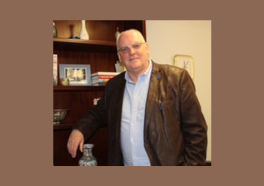- About Us
- Connect
- Learn
- Jewish Life
- Music
- Events
- Give
- Join Us
My Cousin, The Bishop
06/21/2018 03:07:16 PM
Rabbi Jennifer Jaech
| Author | |
| Date Added | |
| Automatically create summary | |
| Summary |
It’s not every rabbi that gets to have a bishop for a cousin. I’m lucky that way. My father’s cousin, Rick Jaech, is the Evangelical Lutheran Bishop of Southwestern Washington State.
Like me, Bishop Jaech does a lot of interfaith and social justice work. One of my favorite photos of him was taken in Olympia, the capital of Washington State. In the photo Bishop Jaech stands with a rabbinic colleague and a representative of the Muslim Association of Puget Sound. The three of them were part of an interfaith effort to advocate on behalf of refugees and immigrants. I’ve also seen photos of Bishop Jaech visiting Israel, and the site of a sacred Longhouse used by the several Columbia River American Indian tribes.
Last summer, Bishop Jaech and I talked about creating an interfaith program. We thought people might be interested in hearing two cousins, a rabbi and a bishop, talk about their respective spiritual journeys. This summer, we will speak together at a Lutheran church in Tacoma, Washington.
When I first became a rabbi, I spoke regularly about my path to Judaism. Many Temple Israel members have heard me describe how I rejected the religion of my upbringing, lived for many years without any formal faith, and then discovered my spiritual home among the Jewish people and in the religion they created. My journey seems like a long-distance one. I started in one faith community and am now firmly rooted in another.
My cousin Bishop Jaech remained a Christian but he also took a journey. Had he remained in the Missouri Synod Lutheran Church in which the two of us were raised, he may have been expelled for his current interfaith work. (In fact, a Missouri Synod Lutheran Church minister lost his job in 2001 for participating in an interfaith service at Yankee Stadium after 9/11.) Like me, Bishop Jaech left the church of his childhood and joined a denomination more in keeping with his spiritual values and expression.
Our parents choose our early religious experiences. Ultimately, if we are wise, we each make our own choices about what feeds our souls and give our lives meaning. This spiritual search is essential to living a fully human life. Leo Baeck wrote: “Only an existence that is not content with the mere fact of existence can have any value.”
Some of our spiritual choices are mindful ones. We may carefully consider options and choose what feels right to us. Other choices are less deliberate. As a young person I never would have predicted that I would follow my heart and discover the treasure that is our Jewish heritage.
The slower hours of summer can bring us the opportunity to reflect on our own paths. Yes, we may continue to feel assaulted by the news of the day and consumed by the worries of our lives. Yet we can make the choice to retreat from the whirlwind now and then. We can listen to the birds as their songs greets the sunrise. We can pause to hear the waves of an ocean or the trickle of a stream. We can look at the child who is holding our hand. And during these moments, we can ask ourselves: How far have I journeyed from the religious experiences of my childhood? Is my soul receiving the nourishment that it needs? “If not now, when?” (Pirkei Avot, 1:14).
I wish you each a meaningful journey this summer.
Wed, April 30 2025
2 Iyar 5785
Temple israel Happenings
-
Wednesday ,
AprApril 30 , 2025 Holocaust Education Today: Challenges and Limits by Dr. Werner Steger
Holocaust Education Today: Challenges and Limits by Dr. Werner Steger
Wednesday, Apr 30th 6:00pm to 7:30pm
Dr. Steger serves as the endowed chair for the Greenspan-Handel Trust for Holocaust and Genocide Studies. -
Saturday ,
MayMay 3 , 2025 Midnight Run
Midnight Run
Shabbat, May 3rd 3:00pm to 5:00pm
Volunteers needed. The Midnight Run is a volunteer organization whose goal is to come together as a community in order to feed the homeless of New York City. They coordinate more than 1,000 relief missions per year with volunteers from churches, synagogues, schools and other civic groups to deliver food, clothing, blankets and personal care items to the homeless poor on the streets of New York City. -
Thursday ,
MayMay 8 , 2025 Brotherhood Steaks, Scotch & Cigars Night
Brotherhood Steaks, Scotch & Cigars Night
Thursday, May 8th 7:00pm to 10:00pm
Join us for an in-person, grown up time to enjoy an early spring evening and just hang out. Men and women are welcome. Brotherhood will provide a BBQ steak & tuna dinner, tasty Scotch and bourbon options, soft drinks and mixers. Registration closes Monday, May 5th at 6:00 PM -
Friday ,
MayMay 9 , 2025 Shabbat Shabbang
Shabbat Shabbang
Friday, May 9th 5:00pm to 6:00pm
Join our clergy for songs, music, crafts, challah, pizza, and yummy treats! We welcome families with children 7 and under (and their older siblings). Bring a friend to share in our Shabbat!
Events
Today's Calendar
| Yom HaZikaron |
Friday Night
: 5:30pm |
: 7:00pm |
Shabbat Day
: 9:30am |
: 10:30am |
: 3:00pm |
Upcoming Programs & Events
Apr 30 |
May 2 |
May 3 |
May 3 |
May 4 |
This week's Torah portion is Parashat Tazria-M'tzora
| Shabbat, May 3 |
Yom HaZikaron
| Wednesday, Apr 30 |




